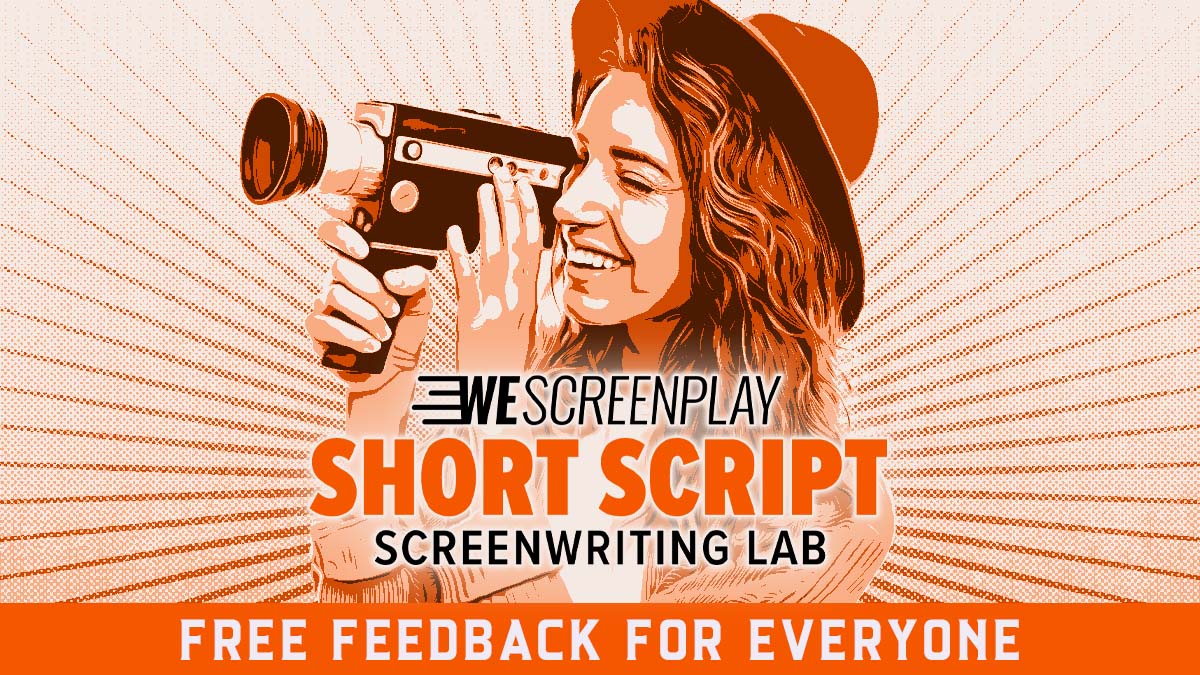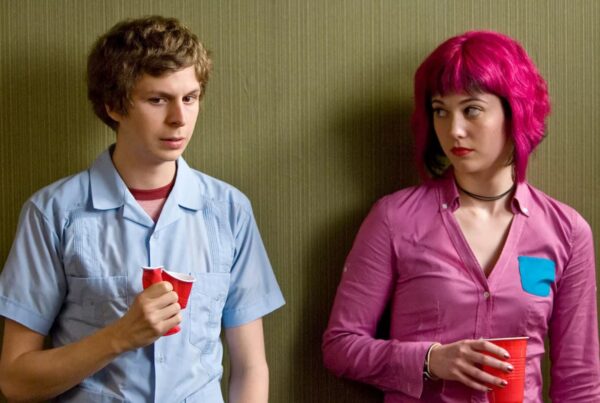
For those who haven't heard, last month, Orson Scott Card's anonymously submitted script, Mesa 1966, earned scores that would have put him in Second Place in the annual WeScreenplay Feature Contest. To ensure that no aspiring writer lost their spot, WeScreenplay – with Orson Scott Card's insistence – awarded an additional and extremely talented Second Place winner, Paul Gross. As a result we had six incredible winners instead of five – based on the talent this year we could've easily chosen ten.
Card's latest contest entry marks something of a departure for the writer in terms of form and subject matter: a screenplay centered around the real-life massacre of five at a beauty school in Mesa, Arizona in 1966. We recently had the opportunity to sit down with Mr. Card in order to discuss his career, the unique challenges of screenwriting, as well as his decision to maintain anonymity before unleashing Mesa, 1966 on WeScreenplay's readers.
You cut your teeth in writing novels, but are shifting over to writing some screenplays now. What's the biggest difference between the two mediums?
Actually, I “cut my teeth” as a playwright. I had written several short musical parody shows before I was in college; once there, under the tutelage of Dr. Charles Whitman, I began turning out play after play. Several of them were produced at Brigham Young University, sometimes directed by faculty members. I wrote verse dramas, comedies, and musicals, and learned a lot about writing “actor-proof” dialogue. You never know what you’ve written till you hear someone else read it aloud — cold. Under such circumstances, if there is an incorrect or incoherent reading, they’ll find it! My approach was not to explain it to the actors until they “got it”; my job was to write it so clearly that it could not be misread.
That instant feedback from actors and other cold readers helped train me for writing fiction, because when readers pick up a novel, they become the full cast of a play, plus the narrator. They’re cold-reading all the dialogue, and, like any other actors, if they can misread it, they will. This brings on that horrible moment when the reader has to stop, go back, and read again in order to understand what was just read. For a playwright, that moment of incomprehension is an error that can be fatal for minutes at a time, for audience members often turn to their companions to ask what the character just said, or what’s happening, and during that time, nobody’s listening to what’s being said now.
It was that hard-earned facility with dialogue that I brought to fiction from my playwriting, along with a strong practical sense of what a scene was — how to build to a climax, how to close a scene in a satisfying way that also points to the issues that still remain in doubt.
Fiction, then, was liberating, because I really didn’t think much about the mechanics of writing. Instead, I essentially wrote plays with slightly expanded stage directions, in past tense, and instinctively following the rules of limited third-person viewpoint. Despite the many flaws of my early stories and novels, the fact that scenes flowed with some emotional power and my characters spoke with interesting, credible voices made my fiction sound to some editors as if I knew what I was doing.
You’d think that switching to film wouldn’t be all that hard because, while there are many differences, film is a dramatic medium like playwriting. I had written dozens of plays; surely I could easily set aside the tools of novel-writing in order to use the toolkit of film.
Not only that, but I had also written several animated film-scripts. For years my bread-and-butter writing had been various series of audio-plays for Living Scriptures in Ogden Utah. Sets of dozens of half-hour plays on subjects like LDS Church history, the New Testament, and American History were performed by fine casts of audio actors and then sold in mall kiosks and door-to-door to families who let their kids listen to them at bedtime, or on a car trip. Here was the most easily distractible audience you could think of. I had to keep young listeners awake till the end of each play, sometimes explaining some pretty sophisticated concepts in history and scripture along the way. I had to make the characters instantly real, their dilemmas and troubles constantly engaging.
That led to writing nearly a dozen scripts for half-hour animated videos on similar subjects. The switch to visual media went reasonably well, and I’m still proud of my work. But because I refused to follow the Disney animation formula of that time, to which the director was committed, I ended up parting ways. I took with me many good things I learned about writing for a visual medium — along with a deep loathing for the way adherence to inappropriate formulas can poison good stories and turn them into bad movies.
So when I was invited by my first and best producers on Ender’s Game, Lynn Hendee and her senior partner, Bob Chartoff, to write a draft of a screenplay, I brought my scene-and-dialogue tools, along with a keen awareness that a lot of static scenes in the novel simply could not be filmed, and therefore I had to find other ways of giving the audience whatever there was of value in those unfilmable scenes.
Trying to adapt your own work must have brought with it a particularly unique set of challenges…
I immediately jettisoned any notion of trying to include the Peter and Valentine storylines, because they consisted almost entirely of children sitting at computers, typing. Likewise, long talky scenes that worked on an emotional level in the book were so deadly when I tried drafts of them that I cut those out of all my scripts, too. (Occasionally I had to put up with whining from some producers — never Lynn or Bob — who would say, “But that’s my favorite scene,” as if the fact that the scene worked in a book had anything to do with whether it would work in a movie.)
However, I was still seriously hampered by some of the baggage that comes from adapting an existing story — not much helped by the fact that it was my story. So much of the novel had been written intuitively, with no plan at all, that I had no concept of what actually made the novel work. It had been a hit, not just with very bright students, but with teenagers who felt lost and abandoned by the schools. Why were dyslexic or failing kids writing to me, saying, “I am Ender”?
It soon became clear that I had to figure out the book before I could write a working script. Draft after draft, people who already loved the book would say, “This is it! You nailed it!” But as soon as we showed it to somebody who had never read the book, they’d read the script and have no idea what made the story such a big deal. Whatever it was in the book that made readers love Ender Wiggin, it wasn’t in my early drafts. Or any drafts, for a long time.
My early drafts were crippled by my having taken to heart the idea that movie scripts are all about the action, with as little dialogue as possible. When I wrote a pilot for a co-production with a small Mexican television studio, in the first moments of shooting the first scene, I started drawing lines through dialogue that was boring and repetitive. This was after I had already, or so I thought, cut the dialogue to the bone. Nobody could understand the situation or the characters without hearing every word. Then I heard the words, and was horrified about how tedious and chatty the scene was. From ten speeches it was cut down to four, and the director gave the cuts to the actors and to all our relief, the scene then worked.
But trying to write to a 120-page limit was cruelly confining. Cutting a scene before I wrote it seriously harmed my writing process. Novels don’t have the length limitations of a movie, or the expository constraints. But movies are pretty lousy if none of the scenes has room to breathe, or if crucial scenes are missing because the writer never wrote them.
Eventually, during a brief time when Richard LaGravenese was involved with the project, he told me, emphatically: Don’t think of the 120-page limit when you’re writing your first draft. Write wherever the story takes you, with whatever scenes feel right at the time. If you end up with a 500-page first draft, who cares? Now the story exists. Now you know which scenes really work, and which can be set aside.
From then on, I relaxed during the writing, and got the advice of more experienced people about what could be cut to get things down to size.
I had no idea what anybody meant when they said, “This feels like a TV episode instead of a movie,” or when, looking at a pilot script, they said, “This feels like a movie, not like episodic TV.” Eventually I learned that this is just something people say when they have no idea what’s actually going on in the script — which is most people who judge scripts in Hollywood.
I don’t mean to be cynical about this — oh, wait, yes I do — but most people in the room during story discussions are there to suck oxygen out of the air, and serve no other purpose. Story is a rare and precious thing, and formulas of any kind kill it. So many executives and “producers” who are terrified that a movie will tank and take their careers with it have learned, not how to create or understand stories, but rather how to parrot the mantras of many screenwriting gurus, whose formulas only apply to a certain kind of action movie — the kind that nobody is proud of making. And coming from the mouths of story-blind movie people, it’s especially offensive. You know, like Peter Jackson thinking that he could add incredibly stupid (but formula-following) subplots to the greatest work of fiction in the twentieth century, The Lord of the Rings — yet leave out the very heart of the story, the Hobbits’ coming of age in “The Scouring of the Shire.” The filming of LOTR was gorgeous. But Jackson shot a script that anyone who actually understood story should be ashamed of.
These formulas poison everybody. But it’s not as if I knew how to structure a movie any better than the gurus. People would spout formula-talk and I’d know it was wrong, but I didn’t know what was right.
The shooting script was ultimately written by the film's director, Gavin Hood. Still, in adapting your own work, you must have gained some insight into why the material worked so well in the first place.
I could go on for ages about the minutiae of each attempt I made to write a draft that had life. But it came down to this: What was always missing — even after the massive rewrite that tried to make it a buddy movie between Ender and Bean, or the versions that made it Ender vs. the adults, or Ender vs. Peter, or Ender vs. the Hive Queen — was the character of Ender Wiggin himself. Because I finally understood that if the audience didn’t love Ender Wiggin, there was no story, and therefore there was no movie.
This much was certain. Ender Wiggin was not the standard bratty movie hero, the one who breaks all the rules and cocks his nose at authority. As I prepared the last draft I wrote, I made the key discovery: For the audience to love Ender Wiggin, they have to feel the allegiance to him that his fellow child-soldiers feel. So instead of showing him being pressured by adults, and instead of trying to explain battle strategy (that’s a recipe for a snoozing audience) so we can see how smart he is, here’s the only thing that matters:
How he treats the other kids.
That’s it. Everything. Total. All. Because the kids — and the readers — saw that even when Ender knew nothing himself, he helped train other kids as assiduously as he trained himself. He helped, he shared, and even those who treated him like an enemy, he tried to help and included when he could.
The result was that the other kids knew Ender cared more about them than he did about his own career, and the only reason he cared about his own career was because there was a real war to be won, against the alien invaders, and he had to be ready to fight those battles. He turned the focus away from the game and toward the underlying purpose of everything.
The kids knew that he loved and cared about them, and that if they followed him, he would lead them to victory. That’s what the audience had to experience. They had to see Ender being both demanding and generous, ruthlessly honest and openly forgiving, quick to admit error and reluctant ever to blame anyone else. If the audience felt toward Ender as the other kids in Battle School did, then and only then would we have a hit movie.
Nobody ever read that script except a few producers who had been with me for years. Nobody at Odd Lot read it. The screenwriter/director never saw it. But finally, after more than twenty versions of the script, I thought: I nailed it.
No, I didn’t nail “screenwriting,” because each story has its own set of challenges. What I nailed was Ender’s Game, so as I saw what ended up on the screen, I could tell myself, There is a way to film this story successfully, so whatever doesn’t work in this movie is not the fault of the book. It could have been done, because I did it. But, of course, you can lose your job at a studio for putting a multi-million-dollar budget into an author-written script.
So, what was next? How did you go from Ender's Game, to Mesa 1966, your recent anonymous submission in the WeScreenplay Feature contest?
Knowing that I still didn’t understand screenwriting, I enrolled in the MFA program at Queens University in Charlotte, and using that as my impetus, and learning a great deal from Hal Ackerman’s workshop, I decided to write a script that:
A. Was not science fiction or fantasy in any way. This was a vital decision because I don’t actually like sci-fi movies very much. They’re usually expensive and the studios don’t care much about character and story. Sometimes you get a brilliant story, as in Deep Impact, but its companion asteroid-hits-Earth movie, Armageddon, had everything wrong with it that’s usually wrong with movie sci-fi. It wasn’t until Arrival in 2016 that I finally got to see a film — based on a Ted Chiang story, so it still depended on a fiction writer — that was science fiction at its full potential.
B. My heart was in romantic comedy, musicals, and character stories centered on family life. Yeah, that genre. I wish I had written Love Actually or Crazy, Stupid, Love, but I didn’t, and I wouldn’t know how to start. Instead, I decided to go with a story that has haunted me since I was in high school: when Robert Smith burst into the Rose-Mar College of Beauty in Mesa, Arizona, and murdered everybody there, including a child. Only a baby that the mother shielded with her body survived.
It was particularly important to me because one of the victims had been in our home only a few weeks before the murders. She had even recommended the beauty college to my mother as an inexpensive way to get her hair done. Even then, the thought struck me: What if my mother had gone that day?
C. What worked for me was that I really lived in Mesa at that time, I heard about the murderer, Robert Smith, from friends at the high school we both attended (I didn’t actually know him), and I could use this painful event as the center around which to structure a story based, to a slight degree, on my own mother and some of us kids.
I could put the family in houses that I knew — but not the house we actually lived in, since in my real life, my faithful father who never thought of abandoning his family got us into a much nicer setting. And I could work into the story my mother’s employment at a sign company in Mesa, though nobody ever died there.
D. I could try my hand at telling, for screen, the kind of story I’ve always specialized in: The story in which the hero has to choose between terrible choices, and then live with whichever terrible choice he chose. The story unfolded while I was writing it, which is the only way I can tell stories.
Since then, I’ve worked with much better screenwriters than myself, like Aaron Johnston, who has collaborated with me on several novels, graphic novels, and now the TV series Extinct, for which, after we developed the storyline and future history together, he wrote every screenplay for season one. Aaron works in the way that screenwriters are taught to work: He knows the scenes before he writes them, and can juggle them around as he works on the plan for the screenplay.
I can’t do that — I mean, can’t — because I don’t know what the scene will be till I see what the characters say and do in the moment. That’s how I wrote my plays. That’s how I write my novels. I don’t know who they are till I hear them talking to each other, lying to each other, trying to hurt and manipulate and soothe and help each other, depending on their relationships at the time. If I try to force a plot on the characters before I really know them, then I feel like I’m just running them around on the end of a stick.
I don’t think anybody can write a story they don’t believe. They may type something that looks like a manuscript or a screenplay, but the pages might as well stay blank.
Aaron’s characters don’t feel author-controlled. So I know it can be done right. I just can’t do it.
So Mesa 1966 suffers from the fact that I really can’t “think like a screenwriter.” I never thought like a novelist or a playwright, either. I think like a storyteller, and then try my best to adapt the story to whatever form I’m writing in, and for whatever audience I’m writing for.
The tragedy of screenwriting is that screenplays are not written for the paying audience of ordinary people. Nor are they written for the actors and crew who are going to bring the script to life on film. They are written for the executives at studios or other funding sources, almost none of whom know how to read a screenplay or how to detect whether there’s a story in it. This is the worst audience in the world, particularly since writers who create with that audience in mind are aiming, not to entertain, but to sell. So they take into account all the ridiculous things that this weird audience believes about screenplays, and obey every formula and rule they can get their hands on.
Every bad screenplay in Hollywood has a “three-act structure” and a ticking clock and all the other things that make so many movies feel hollow and meaningless. And yet many screenwriters seem to feel that the only alternative is to write screenplays to please the arty audience that wants stories of despair and cruelty, told in confusing, “sophisticated” ways.
The well-told tale that the general audience hungers for, telling a story they can care about and believe in, seems to show up almost by accident, in a happy confluence of good writing, good acting, good cinematography and artistic direction, and a funding source that either writes the checks and gets out of the way, or recognizes good storytellers and supports them in all their relevant, productive choices.
What's the biggest challenge for you when you're writing a screenplay?
The problem of coming up with a story that fits the requirements of a medium in which every page is a minute and every minute is a million dollars. The story has to be short. You have to tell it without ever getting inside the characters’ heads, where only novelists can go. In film, you only know people by what they do and what they say, and in many cases, the more they talk the less the audience likes them.
One of your blind judges stated: "Your characters have a depth that really portrays they have lived a life outside of the story you present here." How do you give characters a "full life" in less than 120 pages? I imagine this is easier in a novel when you have more space?
The illusion of a “full life” is not time- or space-consuming. You merely make sure you have your character respond to events and words in ways that show that he or she doesn’t hear those words or see those events the same way everybody else does. This implies that the character has had experiences we’ll never see, that make them respond in an individual way.
SARAH: Do you know what I’m going to do now?
GARY: Break the shower door and call Nick and tell him you’re going to slit your wrists with the glass fragments?
SARAH: Do you think I’m insane?
GARY: Just tell me what you’re going to do, don’t make me guess.
No need to pause or explain. We know that Gary has had a crazy manipulative girlfriend, because that’s right where his mind goes.
In a novel, we get to say things that don’t happen:
When he saw that Sarah was balancing six eggs on a saucer as she walked toward the kitchen, he decided that this time he would not shout, Don’t slip in the blood on the floor! He understood now that this could only be funny once.
This implies an entire story — but you never, never tell that story, though maybe, many pages later, Sarah might refer to her own memory of a previous event. By not explaining, you leave the audience with the strong impression that the characters have had a long and complicated relationship.
How do you accomplish the same thing in a movie? When Sarah, carrying a saucer of raw unbroken eggs, sees Nick approaching, she stops and covers the eggs with her other hand to keep them from rolling. Nick shakes his head.
NICK: I’m not going to —
SARAH: There is no blood on the floor and I’m not going to slip in it!
NICK: That was only going to be funny the one time.
SARAH: It wasn’t.
NICK: It was funny to everyone who wasn’t covered in egg yolk.
That’s where you stop if you’re using this only to imply a past relationship. Of course, you could go on:
SARAH: I was not in that group.
NICK: Now you are, so now it’s funny. The only reason you aren’t laughing is because if you do, those eggs will probably end up all over the floor again.
Sarah starts to laugh. The saucer tips. An egg slips off. She uses the covering hand to catch the egg. But while she catches it, inches off the floor, the other eggs all roll off the saucer in the other direction. She slips in the mess.
Different kind of comedy. Imagine how many eggs, and how many floor-moppings, the cast and crew will go through in the attempt to film the gag. Whereas, the first five lines of dialogue by themselves are easy and cheap to shoot. Just words. And yet they widen the world by giving the characters a past.
Dialogue plays a bigger role in screenplays than novels. Is this something you had to work on when making the transition? What's the best advice you can give about writing believable dialogue?
Forget trying to make the characters “sound” different from each other. All the dialogue is going to come out of your head, so it’s all going to sound like you. That hasn’t hurt Woody Allen or Neil Simon, and it won’t hurt you. If you’re thinking about the dialogue, consciously shaping it, it’ll come out dead on the page.
Instead, you treat each scene as if you were an actor improvising the dialogue in a scene with some pretty clear rules about what has gone before, what each character wants, fears, hopes for, expects, and needs. Without ever thinking about how any character sounds, you improvise (on the page) what he needs to say to accomplish his purpose as he understands it in this moment. And then you immediately give the response that the other character would give to that provocation or kindness or whatever the character conceives the other character’s speech to mean.
The result of this will be an overly logical dialectic — everybody really answers what everybody else is saying, something that never happens in real dialogue. The trick I was told — and it often, but not always, works — is to look at a series of paired speeches and then pull out a pair here and there. Now, instead of following an obvious logic, each character makes leaps, jumping ahead of what the person actually says.
This will often mean that you jettison some of your coolest lines — but that’s a plus. Because if you're ever writing a line that you admire, that you want to show off, then that line of dialogue needs to go. Because the last thing you want is to write a script that stars the writer. I don’t think Neil Simon admired this Odd Couple dialogue:
FELIX: Where the hell am I going to get gravy at eight o’clock?
OSCAR: I thought it comes when you cook the meat.
FELIX: When you cook the meat? You don’t know the first thing you’re talking about. You have to make gravy. It doesn’t just come!
This is one of the most screamingly funny moments in the script. But Simon is making no obvious effort to differentiate the way these characters talk. In the movie, the difference came from two things: The fact that Jack Lemmon and Walter Matthau said them, and the fact that the two characters spoke from the heart. Oscar and Felix wanted and needed different things, and as long as they spoke words arising from their motives and experience, they were going to be as differentiated as they needed to be.
Those lines are alive. They didn’t fall dead on the page, because they arose from character.
Something like this dialogue might feel like a cool trick:
FELIX: Oscar, what is it? Is it the cooking? The cleaning? The crying?
OSCAR: I'll tell you exactly what it is. It's the cooking, the cleaning, the crying.
What do you learn from this, as a dialogue writer? To have someone ask a question that contains a list, and then the other person seems about to offer a different answer, but instead repeats the list?
I don’t think that’s what happened inside Neil Simon’s head at all. My guess is that he wrote Felix’s question and then had Oscar start to answer and realized: Well, that’s the list. So he wrote it down, because, as Simon improvised the characters’ dialogue, that’s what came into his head and the moment it did, he knew that it was right.
Bad or tone-deaf actors, or incompetent film editing, could have killed either of these examples from the funniest script by the greatest comedy writer of the twentieth century. But the potential for greatness was there from the moment these living responses went onto the page. The thing we less-talented scriptwriters learn from this is that it’s never going to be funny or even interesting unless it arises honestly from the needs and worldviews of the characters.
Where do your ideas come from? Do you come up with a concept and then find the best medium or do you look for concepts to fit a certain medium?
I make my living from writing novels, and so I often develop into stories the ideas for which I know I have a ready audience. Sometimes, though, an idea imposes itself on me and then I have to find a publisher for a truly unusual project. The problem is, nobody knows how to market anything of mine that doesn’t have the name “Ender” on the cover and in the book jacket synopsis. Those non-Ender books generally do very well — though I’m always surprised that anybody buys and reads any of this stuff I make up — but I know that if I’m working on a project like that, I’m on shaky ground, commercially.
That said, I’m quite comfortable within many kinds of storytelling, from sci-fi to historicals, fantasy to romantic comedies. And, no matter what I’m writing, the things I read constantly find their way into the stories. Not other people’s fiction — I hope I’m not taking stuff from them — but the nonfiction that comprises most of my reading. History, biography, science, philosophy. It’s the fuel for the engine driving my fiction.
What's next for your writing?
I finally finished Children of the Fleet, the Ender’s Game sequel that I’ve been struggling with for a year. I finished it a week ago today, and I’ve already written the first chapter of the YA novel Lost and Found, about a junior high kid whose life is even more hellish than usual because he keeps finding things, and people keep assuming that he stole them. So when he finds the long-buried body of a murdered child, he hardly dares to report it, for fear he’ll be accused of the crime. Yeah, that’s what children need to read …
Can you tell us a little bit about the process of having your novel turned into a film?
By contract, the studio controls all publicity for the movie Ender’s Game.
Why did you enter WeScreenplay's contest? Was the experience as expected?
I already knew things that I needed to do to Mesa 1966 from the Queens University workshop and from comments by one trusted reader. I only entered the WeScreenplay contest because I knew that I was never going to “find time” to go back to the screenplay, mostly because I had no serious hope of ever writing anything that anyone would even look at. I already knew from years of trying that nobody in Hollywood would talk to me about anything that wasn’t science fiction. But maybe in the context of an anonymous contest, where nobody knew my name from my fiction, I could find out what was really going on with me as a screenwriter.
After the first round, I was astonished at the judge’s comments. I had half-expected to get the standard cant of the screenwriting-class formulas. But instead, there was no hint of that procrustean attitude. Instead, the critic responded to the story I had written, and made suggestions that would enhance the paying audience’s ability to receive that story. I was blown away.
The contest even allowed the entrants time to revise their screenplays according to those comments. I knew that even though I found value in every suggestion, the only way to revise the screenplay would be to write it over again, and with a novel that was already a year overdue, I could not devote the time to Mesa 1966 that it would require. So I let it stand as it was. I figured it would die in the next round of judging, but the contest would still have been worth it, because I was encouraged to think I might have written something that could be valued by a critic who knew movies and had no idea who I was. I knew I would go back to the screenplay and write it again, this time better.
My script went farther than I ever expected, and the comments from the final judge were just as valuable and specific and supportive as those of the first. So no, the contest was not at all what I expected. It was far, far better.
The only disservice this contest does to the contestants is that it will raise their expectations of how Hollywood will respond to a good script. I’ve found that in every studio and production company, there’s somebody, at some level, who is not an idiot, but who instead loves and understands movies and knows how stories work. They’re simply not the people who have control over the money. The money is almost always in the hands of people who are really good at bureaucratic infighting, and nothing else. There is no overlap between bureaucratic skills and storytelling acumen. You would not believe the childish, petty, vengeful, and deeply stupid people who have large careers in Hollywood. But WeScreenplay seems to be composed entirely of that wonderful group of people who understand, love, and labor constantly to try to create good movies. Now and then they win.
So maybe the WeScreenplay contest does writers a favor by showing them that no matter how much rank ignorance and vile behavior one runs into “in the room” and out of it, there are people in the bizness who recognize and value story, even in a flawed script. It might give the good storytellers enough hope that they’ll keep writing.
But at the same time, I must say that if, as a writer, you want to tell stories and have them get to your audience without being mutilated and pissed on by idiots, write them as novels. If the stories are good, they’ll find an audience, and you’ll make a living. I’m far from the Stephen King/Michael Connelly/Robert Patterson/Stephanie Meyer level of sales and income, but I still make a better living, as a novelist, than most screenwriters who aren’t working on a hit television series.
Take the example of Ira Levin (Rosemary’s Baby) and Erich Segal (Love Story), and rewrite your screenplay as a novel. When it does well, you can now approach the studios, not as a supplicant screenwriter, but as the owner of a valuable intellectual property. If it’s a monster bestseller like both of those novels, then you can say, “If you want to make a movie of my novel, here is the screenplay. Shoot this, and the movie is yours. Otherwise, hasta la vista, baby.” I wasn’t in the room, but I’m pretty sure that’s how the conversations went — either from the authors themselves or their agents.
















